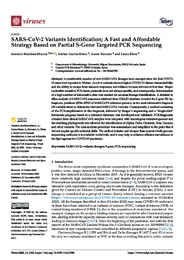Por favor, use este identificador para citar o enlazar este ítem:
https://hdl.handle.net/11000/35093Registro completo de metadatos
| Campo DC | Valor | Lengua/Idioma |
|---|---|---|
| dc.contributor.author | Martínez-Murcia, Antonio | - |
| dc.contributor.author | García-Sirera, A. | - |
| dc.contributor.author | Navarro, Aarón | - |
| dc.contributor.author | Pérez, Laura | - |
| dc.contributor.other | Departamentos de la UMH::Producción Vegetal y Microbiología | es_ES |
| dc.date.accessioned | 2025-01-21T12:04:00Z | - |
| dc.date.available | 2025-01-21T12:04:00Z | - |
| dc.date.created | 2023-03-17 | - |
| dc.identifier.citation | Viruses 2022, 14(11), 2588 | es_ES |
| dc.identifier.issn | 1999-4915 | - |
| dc.identifier.uri | https://hdl.handle.net/11000/35093 | - |
| dc.description.abstract | A considerable number of new SARS-CoV-2 lineages have emerged since the first COVID-19 cases were reported in Wuhan. As a few variants showed higher COVID-19 disease transmissibility and the ability to escape from immune responses, surveillance became relevant at that time. Single-nucleotide mutation PCR-based protocols were not always specific, and consequently, determination of a high number of informative sites was needed for accurate lineage identification. A detailed in silico analysis of SARS-CoV-2 sequences retrieved from GISAID database revealed the S gene 921 bp-fragment, positions 22784–23705 of SARS-CoV-2 reference genome, as the most informative fragment (30 variable sites) to determine relevant SARS-CoV-2 variants. Consequently, a method consisting of the PCR-amplification of this fragment, followed by Sanger’s sequencing and a “single-click” informatic program based on a reference database, was developed and validated. PCR-fragments obtained from clinical SARS-CoV-2 samples were compared with homologous variant-sequences and the resulting phylogenetic tree allowed the identification of Alpha, Delta, Omicron, Beta, Gamma, and other variants. The data analysis procedure was automatized and simplified to the point that it did not require specific technical skills. The method is faster and cheaper than current whole-genome sequencing methods; it is available worldwide, and it may help to enhance efficient surveillance in the fight against the COVID-19 pandemic | es_ES |
| dc.format | application/pdf | es_ES |
| dc.format.extent | 10 | es_ES |
| dc.language.iso | eng | es_ES |
| dc.publisher | MDPI | es_ES |
| dc.rights | info:eu-repo/semantics/openAccess | es_ES |
| dc.rights | Attribution-NonCommercial-NoDerivatives 4.0 Internacional | * |
| dc.rights.uri | http://creativecommons.org/licenses/by-nc-nd/4.0/ | * |
| dc.subject | SARS-CoV-2 | es_ES |
| dc.subject | Variants | es_ES |
| dc.subject | Lineages | es_ES |
| dc.subject | S gene | es_ES |
| dc.subject | PCR | es_ES |
| dc.subject | Sequencing | es_ES |
| dc.title | SARS-CoV-2 Variants Identification; A Fast and Affordable Strategy Based on Partial S-Gene Targeted PCR Sequencing | es_ES |
| dc.type | info:eu-repo/semantics/article | es_ES |
| dc.relation.publisherversion | https://doi.org/10.3390/v14112588 | es_ES |

Ver/Abrir:
SARS-CoV-2 Variants Identification; A Fast and Affordable Strategy Based on Partial S-Gene.pdf
1,09 MB
Adobe PDF
Compartir:
 La licencia se describe como: Atribución-NonComercial-NoDerivada 4.0 Internacional.
La licencia se describe como: Atribución-NonComercial-NoDerivada 4.0 Internacional.
.png)